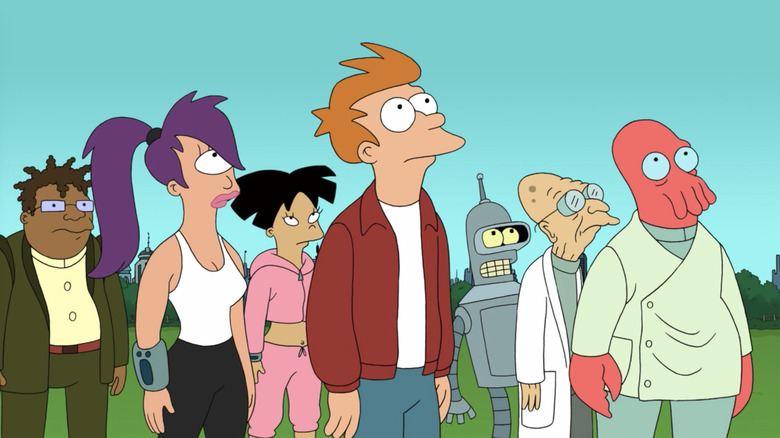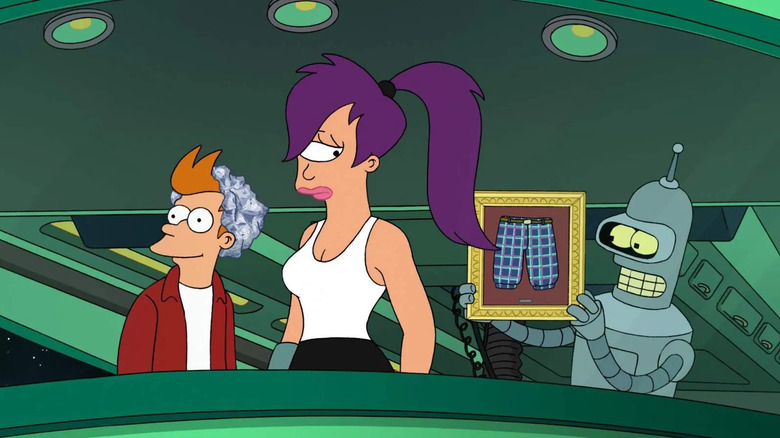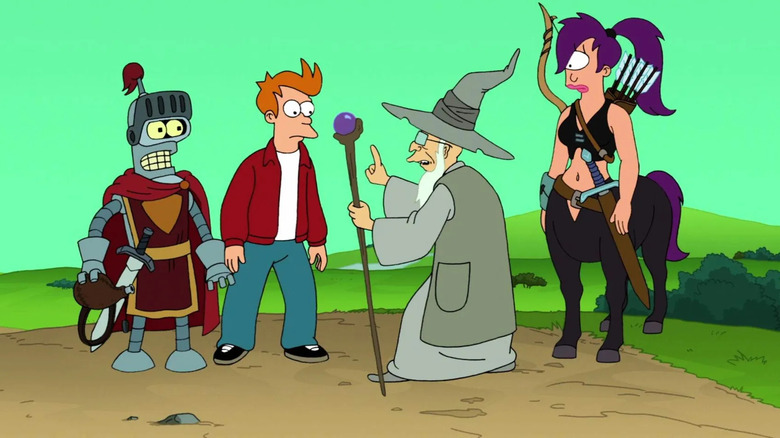Futurama's Stars Played A Key Role In Creating The Series' Characters
In a commentary track on a "Futurama" DVD, voice actor Billy West reveals that his voice for Dr. Zoidberg — the clueless, revolting, dumpster-dwelling lobster medic — was partially inspired by 1940s Hollywood impresario George Jessel, one of the producers on the original "Nightmare Alley" and an actor in films such as "Four Jills in a Jeep" and the bawdy 1969 Anthony Newley musical "Can Heironymus Merkin Ever Forget Mercy Humppe and Find True Happiness?" When series creator Matt Groening incredulously asks West how he knows who George Jessel is, West shoots back with his own age (West was born in 1952).
Fun trivia: Eddie Cantor once joked that his gravestone should be inscribed with the poem "Here in nature's arms I nestle, free at last from Georgie Jessel." Jessel, not to be outdone by the burn, was actually buried next to Cantor.
The writers of "Futurama" likely didn't know that Jessel inspired the voice of Dr. Zoidberg, but, after years of working on the show, they certainly know what West is capable of as a voice actor (West, incidentally, also voices the characters of Fry, Professor Farnsworth, and multiple others). After a long enough time, writers will begin to write to match the characters as the actors created them, and not the other way around.
On the podcast "What's In My Head," "Futurama" writer Eric Kaplan talked with host Julian Hester about how he and other writers construct scripts and jokes based explicitly on how the actors sound.
You know what Dr. Zoidberg sounds like
What Kaplan says may possibly be true of any long-running TV series, of course. There will come a time when an actor has inhabited a role for so long that it becomes their own. At the inception of a TV series — prior to the casting of actors — characters will be determined by showrunners and writers, attempting to communicate who they are on paper. Writers might determine how they speak, and even how they dress and look, but the actor will be the one to make the character live. Once alive, the writers now have to follow the actors' lead, a fact that Kaplan makes explicit. When asked about what he thinks of actors, Kaplan said:
"They're great. I like them, and I have a lot of respect for them. And they have played a huge role in inspiring and enhancing the writing process because they taught us what these characters sound like, you know? They've embodied the characters, so they kind of go from ideas to real people. And once you know what Dr. Zoidberg sounds like, what Bender sounds like, they become much easier to write for."
Bender the alcoholic robot is played by actor John DiMaggio, who also plays multiple roles on "Futurama." When an actor plays multiple parts, there is every possibility that a writer will not just write to their most popular character's line delivery, but craft entire supporting roles out of a particular actor's set of talents. Another tidbit from a "Futurama" DVD commentary track: Sometimes when actors are messing around in a voice booth, spitballing and practicing impressions just for fun, said impressions may just work their way into a future episode. DiMaggio, it seems, can do a killer impersonation of Tracy Morgan.
The dance
Kaplan is, of course, diplomatic about the combined efforts of cast and writers on their contributions to an animated program. An animated character, after all, is going to be voiced by an actor, written by a writer, and then "acted" by a team of character animators. Kaplan is enamored of the entire process, and appreciates that he gets to be just part of a larger team that can bring Bender, Fry, Leela, or any of the other characters to life. He said, in speaking about voice actors:
"So they are revealing the characters to us through their performances as we are revealing the characters to them through our writing, and then of course the character designers and the directors are also doing it. It's quite lovely, it's a lovely dance, it's a lovely square dance of space cartooning."
DiMaggio, on a commentary track, once said that he kind of has it easiest. While his work load is heavy as a main character on "Futurama," he reached a point where he is comfortable coming back to a small handful of characters over and over. DiMaggio wanted to give props to actors like Maurice LaMarche and Tress MacNeille, veteran voice actors who frequently play background characters and incidental robots. It's much harder to come up with a new voice for "Heckler #5" than it is to rely on one that has already been invented.
Everyone, it seems, is impressed by everyone else's talents on "Futurama." Perhaps that professional camaraderie can speak to the show's many lives and longevity.
New episodes of "Futurama" will air on Hulu in 2023.


